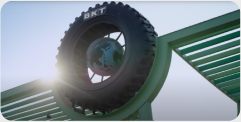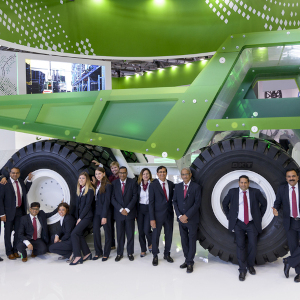It’s that time of the year. The sun is out, the weather is warm and we have to ensure that our tires are ready for the drier weather conditions. In this article we highlight the best industrial tires for summer and dry terrains.
How industrial tires are affected by low moisture
Low moisture conditions can have several effects on industrial tires. Here are some ways in which low moisture can impact industrial tires:
Dry and Cracked Rubber: Rubber in industrial tires can become dry and fractured when exposed to low moisture levels. Because of the lack of moisture, the rubber loses its flexibility, making it more prone to cracking and deterioration. Rubber cracks can undermine the tire's structural integrity and shorten its lifespan. This may hasten the aging process of the tire, causing it to deteriorate faster. As a result, the tire is more vulnerable to punctures, cuts, and other types of damage.
Reduced Traction: Low moisture levels can cause industrial tires to lose traction. The dryness can harden the tire surface, resulting in decreased ground grip. This is especially problematic in applications requiring traction, such as off-road or heavy-duty situations. Increased slippage, less stability, and probable accidents can all result from decreased traction.
Increased Wear and Tear: In low moisture settings, industrial tires may undergo higher wear and tear. Dry weather can cause tire tread to wear out faster, reducing the tire's capacity to provide enough grip and traction. Furthermore, the lack of moisture can produce increased friction between the tire and the surface, causing the tire to heat up faster, especially when the tire is under load or in high-speed applications. The elevated temperatures, along with the already damaged structural integrity caused by dryness, can result in tire failure and potentially dangerous blowouts, resulting in accelerated rubber compound degradation.
To mitigate the effects of low moisture on industrial tires, electing tires specifically designed for the intended operating conditions can help minimize the impact of low moisture environments.
Common issues associated with industrial tires driving over dry terrain
Driving industrial tires over dry terrain can present common issues, including:
Heat Buildup: Heat is generated on dry terrain due to increased friction between the tire and the ground. Heat buildup in the tire can cause it to overheat, potentially resulting in tire failure, blowouts, or other performance concerns. It is critical to check tire temperature and avoid prolonged exposure to hot weather.
Tire Pressure Fluctuations: Tire pressure can fluctuate in dry terrain with large temperature differences. Tire pressure rises as the temperature rises, and falls as the temperature falls. These variations can have an impact on tire performance, stability, and fuel efficiency. Tire pressure must be monitored and adjusted on a regular basis to ensure peak performance.
By being proactive in tire maintenance and selecting appropriate tires, the challenges associated with driving industrial tires over dry terrain can be mitigated, ensuring optimal performance, safety, and longevity.
Cost saving, why you should have summer and winter industrial tires
Having both summer and winter industrial tires can result in significant long-term cost savings. Summer tyres are made for hotter weather and provide better traction and durability on dry surfaces. Winter tires provide superior grip and control in cold temperatures and icy/snowy terrains. You can maximize performance, longevity, and safety while minimizing tire wear and premature replacements by selecting the proper tire for each season, resulting in cost savings and greater tire value.
BKT Recommendations:
BKT Earthmax SR 31: is an all Steel radial tire designed for articulated dump trucks and wheel loaders. This tire has exceptional strength and stability, whilst the non-directional rigid block pattern stands for both excellent traction and maneuverability. The Earthmax SR 31 radial casing structure also provides reduced rolling resistance offering significant fuel savings.
BKT Earthmax SR 22: is also an all steel radial tire specially designed for motor graders and loaders operating in extreme winter conditions on ice or snow. This tire allows operators to appreciate both excellent traction and stability provided by the large and non-directional tread design.
Check out our other advanced tire collections here.






.jpg)